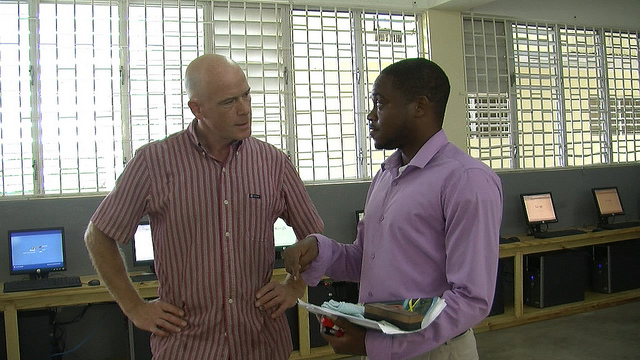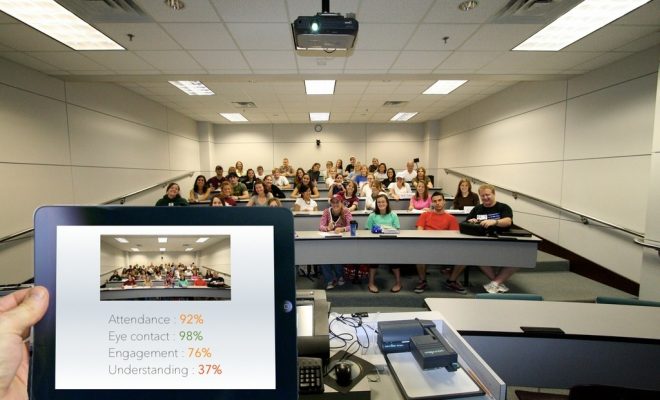Here’s Why Online PD Won’t Work if It’s Not Job-Embedded

A former New York City PD director and blended learning specialist weighs in on online learning for teachers.
A guest post by Michael Weinraub
When I was teaching education courses to beginning New York City teachers in the early 2000s, our department had a problem that every institution of higher education would love to have: an explosion in enrollment. From a student body of hundreds of graduate students, our enrollment boomed to thousands in the span of a few years, due primarily to “alternative” pathways to teaching like Teach For America and the New York City Teaching Fellows. Our faculty needed to act quickly to accommodate this overwhelming influx of students, and we looked to blended learning to satisfy our need to scale. When I say “blended learning” I’m referring to the strategic combination of online and in-person learning into a cohesive whole. (There’s a much richer description at the Blended Learning Universe, a hub of useful resources curated by the Christensen Institute.)
Our approach was to utilize a version of the rotation model, working in-person with one group of students each week while the others engaged in structured activities online. Structuring the learning this way, I was able to work directly with 100 students over the course of the semester rather than just 30. Voila, a victory for expediency and efficiency!
But did we celebrate a victory for deep engagement and real learning? That’s the question I’ve been grappling with for the last dozen years that I’ve been actively involved in the digital learning space, first as a designer and instructor, then as a professional development director in the New York City Department of Education, and now as a blended learning specialist at Public Consulting Group. Digital teaching and learning, whether fully online or blended, is just as varied as traditional learning modalities when it comes to effectiveness. Success or failure is truly in the details.
So what actually contributes to meaningful and effective digital learning for teachers? Above all, it should be job-embedded. It goes without saying that professional learning should be relevant to learners and directly related to the skills and understandings they will need to improve at their jobs. But the type of job-embedding I’m talking about concerns empowering teachers to engage in meaningful learning activities that they have selected as a part of their professional responsibilities. While there are exceptions to the rule, most teachers have limited choice over how and when they learn. Training that is deemed essential takes place in person through workshops, meetings, or coaching while elective, online activities are offered separately, usually to be pursued on “your own time.”
In-person professional development is seen to fall within a teacher’s primary responsibilities–for which they are paid (not an insignificant detail)–and is fully embedded within the social and pedagogical realities of teaching and learning. Online learning, on the other hand, usually takes place outside the school community. As such, the experience is virtually disembodied (the very opposite of embedded), not because it happens remotely, in a digital space, but because the work is situated apart from the relationships that matter most: teacher to student, teacher to teacher, and teacher to administrator.
The implicit message here is that real learning happens in real life, and elective learning takes place online. Digital learning for teachers will only work, and can only be evaluated successfully, when digital elements like courses, modules, professional learning communities, and social networks are brought to the table as valid parts of a professional learning system and not merely add-ons. What exacerbates the problem is that online learning is not only commonly offered outside of the school-based community of teacher participants, it is often situated outside of any community of learners, in the form of self-paced courses. Now, I am not opposed to self-paced learning per se–some of my best friends are autodidacts–but I believe strongly that opportunities to socialize knowledge are essential for students and teachers to be able to apply what they have learned.
So what is to be done?
I believe that the move toward personalized and competency-based learning directed powerfully toward students will grow exponentially for teachers as well in the coming years. One manifestation of this should be expanded opportunities for teachers to select the modality of learning they prefer: in-person, online, or blended. This can only happen if the online and blended learning activities made available to them match their needs. Schools and districts can take a decisive leap in this direction by identifying core professional development experiences that are now offered only in person and transforming (or translating) them to robust online and blended versions.
While some might criticize this as unimaginative or worse, as sustaining the status quo, I can only think of how Octavio Paz described translation, insisting that “every translation, up to a certain point, is an invention and as such it constitutes a unique text.” His description only begins to capture, I think, what is possible when teachers, instructional designers, and multimedia specialists come together to create these new “texts.” What’s fascinating is that these new texts, the online and blended learning activities that emerge from the strategic collaboration of designers and pedagogues, are often more engaging and performance-based than the originals on which they were based. There is something about the shift in modality, from in-person to online, that compels the designer to create alignment among objectives, materials, and activities that is not always evident in in-person PD. In this way, the translation is very often superior to that which has been translated.
But none of this is easy. Effective teaching is art and performance at least as much as it is science and technique, and the same thing applies to designing online learning. The design, development, and delivery of these new online and blended “texts” will require a commitment of time and resources, and the time to allocate them is now.
Michael Weinraub is a former bilingual teacher, literacy consultant, and professor of Education at Pace University in New York City. He is now a blended learning specialist at PCG Education.






